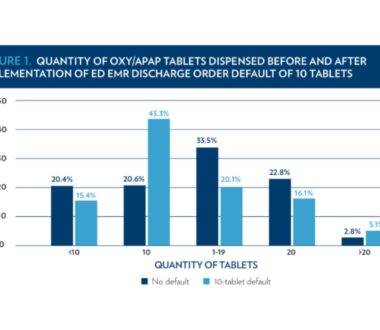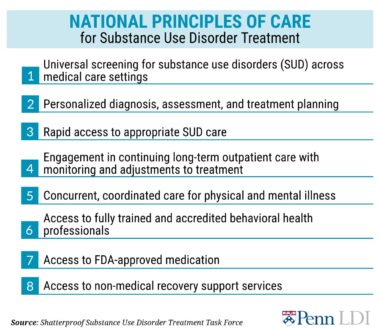
Achieving Value in Substance Use Disorder Treatment: Paying for What Works (and Not Paying for What Doesn’t): Workshop Summary
More than 100 policymakers, practitioners, and researchers discussed and debated how payment policy can promote evidence-based, cost-effective substance use disorder treatment, in a recent workshop hosted by the Center for Health Economics of Treatment Interventions for Substance Use Disorder, HCV and HIV (CHERISH) and the Leonard Davis Institute of Health Economics at the University of […]

CHERISH Workshop Addresses an ‘Unfortunate Reality’ of the Addiction Treatment Industry
Funded by the National Institute on Drug Abuse and established in 2015, CHERISH is a five year collaboration of researchers from the Leonard Davis Institute of Health Economics (LDI) of the University of Pennsylvania, Weill Cornell Medical College, Boston Medical Center, and the University of Miami. Their work is focused on studying the health economics […]

Treating Pregnant and Parenting Women with Opioid Use Disorder and Their Infants
The opioid epidemic carries with it another epidemic, this one of infants born with neonatal abstinence syndrome (NAS), stemming from in utero exposure to opioids. NAS is characterized by withdrawal symptoms such as tremors, irritability, poor feeding, respiratory distress, and seizures. In a recent day-long course at Penn sponsored by the Substance Abuse and Mental Health Services […]

LDI Awarded Grant to Study Payment Policies for Opioid Use Disorder
A Penn LDI-Shatterproof Collaboration The University of Pennsylvania’s Leonard Davis Institute of Health Economics (LDI) has received a grant from the Laura and John Arnold Foundation (LJAF), in partnership with Shatterproof, to study the logistics and policies related to the public and private insurance industry’s coverage of opioid use disorder treatment. LDI is Penn’s hub of […]

Association between Electronic Medical Record Implementation of Default Opioid Prescription Quantities and Prescribing Behavior in Two Emergency Departments
Key Findings Setting a low quantity of opioid tablets as the default option in electronic medical record prescribing orders may “nudge” clinicians to prescribe fewer opioids. When two emergency departments implemented a 10-tablet default instead of a manual entry, the proportion of 10-tablet prescriptions written more than doubled, from 20.6% to 43.3%. Conversely, 20-tablet prescriptions […]

Insurers Make Historic Commitment to Improve Access and Quality of Treatment for Substance Use Disorders
In a groundbreaking announcement, 12 large insurers, covering over 240 million lives, pledged to adopt eight evidence-based “National Principles of Care” for the treatment of substance use disorder (SUD). The initiative is designed to improve care for the 21 million Americans who have an SUD, only 11% of whom receive any treatment at all. The […]

Abuse Deterrent Opioids: A Hard Sell
One strategy to combat the opioid epidemic is to change the formulation of opioids to deter abuse. Reformulations can make opioids harder or less pleasant to inject, snort, or chew, thereby reducing common methods of abuse. Since 2010, the FDA has approved 10 opioid abuse deterrent formulations, which are considerably more expensive than regular brand […]

Addressing Gaps in Evidence-Based Opioid Policy and Practice
Although evidence from health policy research should inform policymaking, researchers and policymakers don’t always communicate. A conference sponsored by the Center for Health Economics of Treatment Interventions for Substance Use Disorder, HCV, and HIV (CHERISH) – a NIDA-funded Center of Excellence – and hosted by the Leonard Davis Institute of Health Economics (LDI) sought to […]

CHERISH Conference on Substance Use Disorder Treatment Research
In the opening plenary panel of the CHERISH (Center for Health Economics of Treatment Interventions for Substance Use Disorder, HCV and HIV) conference on evidence-based policy and practice are (l to r) Daniel Polsky, PhD, moderator and Executive Director of the University of Pennsylvania’s Leonard Davis Institute of Health Economics (LDI); Tom McLellan, PhD, Chairman of the Board and […]

Philadelphia Task Force Issues Report on Opioids
The opioid epidemic is a national problem, but solutions may be local. In Philadelphia, the Mayor’s Task Force to Combat the Opioid Epidemic recently released a report with 18 recommendations for a “comprehensive and coordinated plan to reduce opioid use disorder and its associated morbidity and mortality.” The report focuses on Philadelphia, but draws on data […]

The Older Face of the Opioid Epidemic
In a recent report, the CDC tracks drug overdose deaths in the US between 1999-2015. The trends are not exactly what you might expect. Yes, given the recent press attention to the US opioid epidemic, the rates are predictable in that they are unacceptably high and increasing at a shocking rate. Age-adjusted drug overdose rates increased to 16.3 […]

Philadelphia Tackles Opioid Crisis
Opioids have emerged as one of the greatest public health threats facing the United States. Nationally, fatal overdoses involving opioids have quadrupled since 1999. Opioids contributed to over 33,000 deaths in 2015 alone. In Philadelphia, the numbers are equally sobering. Although the final toxicology reports are pending, approximately 900 deaths in 2016 have been attributed to unintentional drug […]
Engage with CHERISH
Submit a Consultation Request or Contact Us to learn more about how CHERISH can support your research or policy goals.